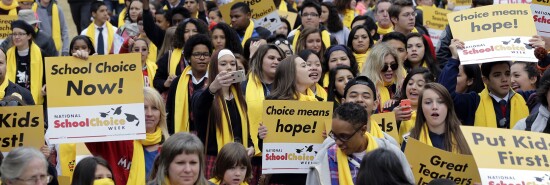
Failing school district denies charter school application … again
Jack Elbaum
Video Embed
There is a concerning number of places around the country where it is nearly impossible for educational achievement to get any lower.
Tennessee’s Jackson-Madison County School District appears to be one of those places. In 2021, its schools had an average math proficiency of 10% and an average reading proficiency of 17%. This put it in the bottom 10 of Tennessee school districts and in a significantly worse position than the national average.
A BURNING ISSUE: BIDEN AND DEMOCRATS LOOK TO COMBAT EXTREME HEAT ACROSS THE US
It would be reasonable to conclude that this may be a prime location for a new charter school. Adding a little competition that reorients incentives toward boosting learning outcomes seems like a good idea.
Well, so did the American Classical Academy, which applied to start one in the district. However, earlier this week, the school board denied its application. This is the second time it has been denied, the first time being just a few months ago, now prompting yet another appeal.
Why was it denied? The district listed dozens of reasons. But many of those reasons were disputed by the ACA, and some were just bizarre. Also, as I noted, it would be quite difficult for a new charter school to have outcomes worse than those of the traditional public school district there. There is nowhere to go but up. And the data suggest, including a new study from Stanford, that the exact opposite is likely to happen, as charters actually lead to better outcomes on average.
The group recently wrote an op-ed in which it pointed out that charters are popular in the state. It read: “A recent poll finds that more than 60% of Tennesseans support public charter schools, including 73% of Tennesseans from West Tennessee.”
Additionally, the practice of having the school board for the district decide whether or not to allow a certain competitor to open up is quite bizarre. It would be as if we allowed McDonald’s to decide when and where a Wendy’s can open in the same neighborhood. The reason it is a bad idea is obvious: The incumbent will always resist new competitors if it has any say in it. That is just natural. The difference is that we don’t actually give that power to almost any incumbents other than the traditional public school system.
Of course, some government entity will have to make the decision. But it ought not to be one that is as much a nakedly interested party as the district school board, which will then have to compete, to some extent, with the charter school for attendance.
There are so often elementary principles that most people understand that they then completely forget when it comes to education. If monopolies are bad and hurt consumers, for example (which most people intuit), then it remains true when the monopolist is the government and the industry is education. It harms students because, just like in regular markets, the absence of competition creates conditions in which there is no incentive to innovate or excel. It traps children in failing public schools with no way out.
So I’d be pleased if the denial of ACA’s application is more an expression of genuine, albeit narrow and technical, problems with it rather than a show of power from incumbent forces that don’t want to deal with competition.
But not much has convinced me that is actually the case. After all, the superintendent seems to be approaching this as a political fight, posting “#winning” after denying the first application and also doing work with anti-charter special interest groups.
The only people who benefit are those who have an interest in maintaining the traditional public school monopolies. Who does it hurt? Those who are always hurt by monopolies the most: consumers. In this context, that means students.
It is a good thing the tide is starting to turn on this matter.
CLICK HERE TO READ MORE FROM THE WASHINGTON EXAMINER
Jack Elbaum is a summer 2023 Washington Examiner fellow.
